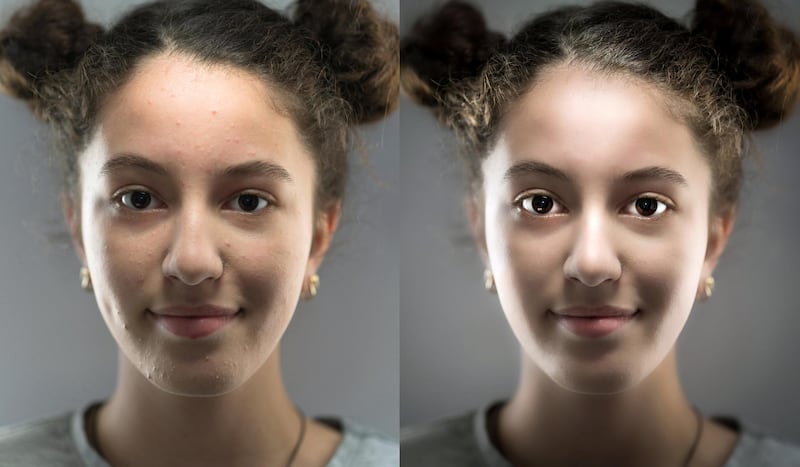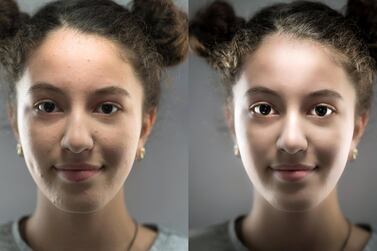Augmented reality filters have been a surreal part of our existence for almost five years now. Snapchat launched the trend with a series of animated filters that transformed your selfies into zombies, dogs and strange doe-eyed beings who were able to vomit rainbows. It was all feel good family fun.
Instagram followed suit in 2017, a year after it launched its Snapchat-rivalling story function. But by then, the innocent animal filters and funny face changers had given way to something far more sinister. Instead of adding a novelty monocle or comedy moustache, these new filters altered the face in a more subtle way, a way that allowed people to see themselves with wider eyes, slimmer noses and sculpted jaw lines. They cleared skin of imperfections, whitened teeth and elongated lashes. They allowed users to visualise a perfected version of themselves, dangerously blurring the lines between the real you, and the you pictured on the screen.
At first, these filters crept in attached to other gimmicks – a flower crown or mouse ears – leading to Instagram’s main feeds being inundated with selfies featuring some kind of animated element. No, it wasn’t because people wanted to post a picture of themselves looking like a dog, it was because dog nose aside, they liked what the filter had done to the rest of their face.
Fast-forward to 2019, and filters are no longer trying to hide their face altering functions. Some are designed purely to plump the lips, others to accentuate cheekbones. In fact, some just are just outright themed around surgery. One released earlier this year called ‘Pastica’ altered your face to mimic extreme plastic surgery, while another, ‘FixMe’, covered your face with the kind of mapping a plastic surgeon would use before operating.
It took filters that extreme for Instagram to recognise just how damaging this is, especially to young people. This week, the social media platform announced that such filters would be banned. Speaking on Tuesday, a spokesperson for the Facebook-owned site said, “We're re-evaluating our policies - we want our filters to be a positive experience for people.”
It added that while this “re-evaluation” was taking place, all filters associated with cosmetic surgery were to be removed from the platform, while any future filters created by users following such a theme would not be approved.
The news was met with much support on Twitter. “Most people just pass filters off as 'girls having fun' and to just let girls enjoy things - but when you haven't posted a photo without one of these filters since 2016, then it clearly is something deeper than just 'fun'," one user said.
It's a point that will resonate with many social media users. Posting tweaked images has become commonplace amongst many young adults, and no matter how confident you feel with your own self-image, filtering and editing pictures is only going to make you acutely aware of your perceived flaws each time you look into an unfiltered mirror.
And scarier still, plastic surgeons around the world are reporting a huge increase in the number of young people coming in. And when they do, it's not pictures of supermodels or their favourite celebrities they are clutching, it's pictures of themselves, filtered and edited. Surgeons have even coined a term for it, the "Snapchat effect". What started out as a bit of fun online has spilt over into the real world, leading young people to make permanent changes to themselves in the hope of becoming who they see on their screens.
In the grand scheme of things, social media is still young, and the lasting effects it can have on impressionable users are becoming ever more apparent. That Instagram has recognised this and is taking steps to do something about it is a step very much in the right direction. It’s time to take the filter off, before we no longer recognise ourselves.







